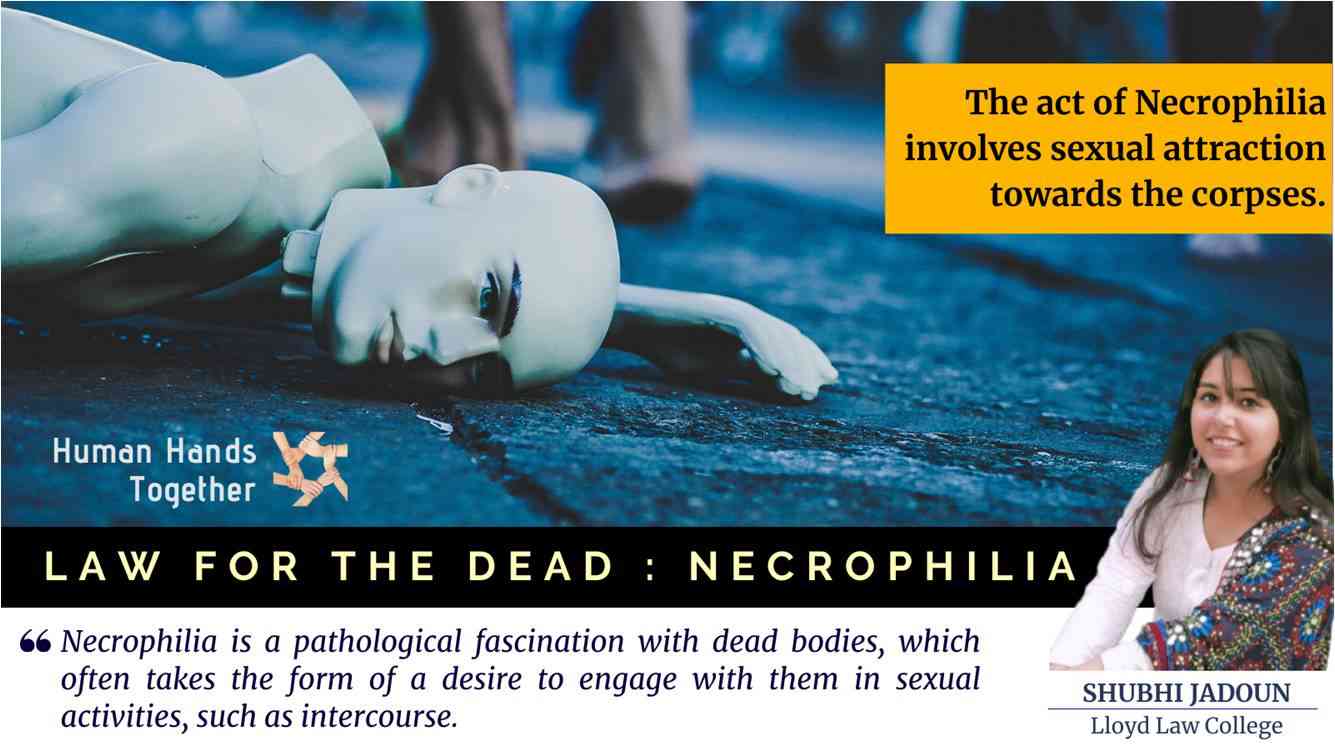- Shubhi Jadoun
Lloyd Law College
What
is Necrophilia?
Paraphilia is a conduct where one is
explicitly sexually stirred towards objects, targets which are surprising or
unusual interests. World Heath Organisation has classified ‘Necrophilia’ as a
‘paraphilia’. The act of Necrophilia or necrophilism involves sexual attraction
towards the corpses. It is a psychosexual disorder where one has bizarre fantasies
revolving around the corpses.
Necrophilia out and out isn't generally a
wrongdoing as there are classes of necrophiliacs, they could be heartfelt or
romantic necrophiliacs who simply stay joined to the body of their dearest
individual yet then again, is destructive or homicidal necrophiliacs who will
in general murder the person to satisfy their obsession.(1)
The latter obviously comes under the purview of a wrongdoing.

Some incidents of Necrophilia
Nithari Kand, a case that shook the nation in
year 2006, It was quite possibly the most awful occurrences where various kids
were kidnapped, attacked, executed, and furthermore were casualties after their
passing, that is necrophilia. Sadly, police confronted a ton of obstructions to
documenting an argument against the blamed, Surender Kohli and Mohinder Singh,
for necrophilia as Indian criminal justice framework is irrationally quiet for
it and has no clear cut laws in the nation for managing the wrongdoing.
Indeed, even a very long time after the
Nithari Case, as most recent as in 2020 May, a man in the town of Demaji area
in Arunachal Pradesh endeavoured the act of necrophilia on a 14-year-old young
girl's body yet wasn't charged for it but charged under IPC, POCSO.
Do we
have a law for it?
Issue doesn't lies in proving the blame of
these accused, the issue lies as to for what wrongdoing, would they be
rebuffed, as we have no direct law.
Argumentation have been made concerning
section 297 of the Indian Penal Code
that by one way or another deal with this wrongdoing. It read as follows:-
“Whoever, with the intention of
wounding the feelings of any person, or of insulting the religion of any
person, or with the knowledge that the feelings of any person are likely to be
wounded, or that the religion of any person is likely to be insulted thereby,
commits any trespass in any place of worship or on any place of sculpture, or
any place set apart from the performance of funeral rites or as a depository
for the remains of the dead, or offers any indignity to any human corpse, or
causes disturbance to any persons assembled for the performance of funeral
ceremonies, shall be punished with imprisonment of either description for a
term which may extend to one year, or with fine, or with both.”(2)
It is relevant to take note of that it
specifies, "commits trespass", which is an essential to be
satisfied to charge the individual under the said section. It implies
individuals previously working in graveyard; funeral home would never be
expected to take responsibility for it as they are with permission or authority
around there and can't intrude especially.
Additionally, contentions have been made
regarding "offers any indignity" and the discipline thereof,
which can only be stretched out to one year. Human dignity be during a period
of living or dead remains the same, at that point how might an undignifieddemonstration
of sexual assault be rebuffed with such less punishment. Punishment to a
wrongdoing must be founded on prevention hypothesis, i.e., deterrence theory,
so that, psyche of the individual doesn't permit him to carry out such
wrongdoing when he considers it. Notwithstanding, with such indulgent
discipline, one can consider doing it as and when he wished to as he would be
out of the grasp of Indian Law. This discipline in any reasonable human's view,
is exceptionally less for such an offence of offering outrage to any human
corpse or his dignity.
In a report, John Trayor rightly pointed as to
how dead bodies become quasi-subjects before law as they aren’t ‘person’
anymore and this would make the act of necrophilia just an act of vandalism, as
it is done against a mere ‘property’.(3)
This sounds upsetting as human pride and love
of family doesn't changes with the situation with a being. A simple actuality
that an individual is dead can't remove his dignity and permit the culprit to
commit the demonstration of necrophilia to a so called 'property'.
Conclusion
United Kingdom, New Zealand, Sweden, South
Africa, Australia, have in one way or the other made the act of Necrophilia
punishable. Also like Section 182 of Criminal Code, Canada, which does not expressly
mentions about necrophilia but talks about any act that offers indignity or
interferes with a dead body. Punishment for this offence
is also 5 years which is much more as we have in India that is of 1 year that
too if pre requisite of ‘trespassing’ is fulfilled.
India needs to change its laws and make the
particular demonstration of necrophilia a wrongdoing as it is doing nothing but
bad as we can see that even after
Nithari Kand, that shook the country, and as of late in 2017 they were granted
capital punishment, even the most noteworthy discipline of capital punishment
couldn't stop or forestall the individual in Arunachal Pradesh in the year 2020
to play out the demonstration of necrophilia towards a corpse of a little
youngster and offered outrage, indignity to her body.
REFERENCES
[1] ANIL AGGRAWAL,“A classification of necrophilia”, Journal of Forensic and Legal Medicine, available at https://www.sciencedirect.com/science/article/abs/pii/S1752928X08002564?via%3Dihub
[2] §297, Indian Penal Code, 1860
">[3] JOHN TRAYOR, The conversation, available at https://theconversation.com/why-we-are-so-fascinated-by-people-who-want-to-have-sex-with-dead-bodies-28622



Well said! To me, the law as stated here seems to be vague, naïve and very outdated. It needs to be updated with clear, concise language for such a heinous moral crime.